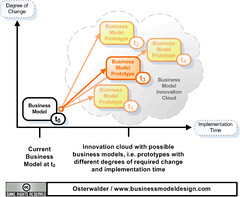 Image by Alex Osterwalder via Flickr
Image by Alex Osterwalder via FlickrIn my Financial Planning and Analysis work, I had the opportunity to review and develop many business plans for both large corporations and for entrepreneurs. A conclusion I have reached is the traditional business plan is not appropriate for entrepreneurs.
When I review my small business consulting work, I have helped entrepreneurs develop four types of business plans depending on where they are in their business life cycle:
- The "Idea" Business Plan: It is a summary where you describe your venture in broad strokes and what will be required to make it happen. The objective is to answer the question to you concerning the feasibility of the idea. And, yes at times I have seen the original genesis on napkins (They were big ones).
- The "Equity Financing" Business Plan: This highly polished 20-35 page document is used to persuade equity partners to invest now. The objective is to sell a potential investor on the value of a ‘show & tell’ meeting with you.
- The "Operating" Business Plan: This plan evolving over time contains the details documenting how to operate your business from launch date to maturity. This Business Model can be used to highlight key processes for improvement.
- The "Bank/Debt Loan" Business Plan: This conservative version of the business plan is used to apply for a loan and focuses on persuading the banker that you can satisfy their lending criteria. Be careful since this plan can be the source of financial covenants you must meet in the loan document.
I did some research given my corporate background since none of these were the traditional corporate business plan that I had developed and taught how to do over the past twenty years. I found from my experiences and research the entrepreneur needed a more flexible planning approach for the following reasons:
1) Mindset: As I observed, entrepreneurs and larger corporations think differently and have different goal structures. Research conducted in 1997 by Saras D. Sarasvathy, Phd of the University of Virginia
- Take a predetermined goal and given a set of means,
- Develop any new means needed to achieve that goal,
- Identify the best cheapest, fastest, most efficient way to achieve that given goal.
Effectual reasoning is opposite of casual reasoning in that it begins with a set of means and allows the goals to emerge over time. It is more of a stepping stone or option approach. A good analogy can be derived from my restaurant consulting experiences. Casual reasoning would be when a client provides the catering chef with a menu and the chef then determines the most effective way to prepare the menu. Casual reasoning would be when a client asks the chef to prepare a menu at the last minute with what he currently has on hand. The chef then looks at all the potential outcomes to make a decision. The latter better reflects the mindset of the entrepreneur while the former reflects the business manager or strategist's in existing enterprises.”
2) How do you research new? Traditional business planning focuses on getting the market research right before you do anything else. How to you research new? Entrepreneurs gain their best market research from actually launching in an Alpha mode and then adapting to the market as it responds to their new venture's offer.
3) Its all going to change! Entrepreneurial research shows successful outcomes have high deviation from their original concepts. The traditional business plan asks us to sit down and plan out the next 3-5 years and describe in detail the sequence of events. Experienced entrepreneurs know that there are just too many variables in resources, market acceptances, timing, product development and the entrepreneur themselves to predict meaningfully in detail the traditional 3-5 year business plan forecast. The entrepreneur will rely on their ability to adapt to the changing environment as it evolves around them.
4) Opportunities won't wait. It is going to take you upwards to 6 months to write a traditional business plan. More than likely the opportunity you are researching has already been exploited by another entrepreneur who understood that 'timing was everything'.
5) Its already happening! Many successful entrepreneurial enterprises are started by current experts who have directly experienced the pain of a particular problem for which they have come up with a solution. They have less need for a traditional plan because they are more than likely to use their insider knowledge and experience and strategic alliances to firstly evaluate the opportunity, utilize their business network, and then to take it to market via their current accessible distribution channels.
6) What does it prove anyway? Too many new budding entrepreneurs concentrate on creating the perfect business plan where they should be concentrating on creating the business. There are far more convincing methods that you could adopt for a proof of concept:
- A web site collecting email addresses of interested customers
- A prototype already in the market under limited release
- Customer lists and testimonials,
- Embedded release with a key strategic partner, customer and supplier support.
The planning process could be counter-productive for the entrepreneur because it can create a certain paralysis from too much analysis.
Conclusion
Entrepreneurs should not abandon the planning process all together. They should approach it from a perspective that best approaches the way in which they develop and exploit their opportunities.
Sources:
Baskerville, Peter; Guild (KPG), Knol Publishing. Business Planning for Entrepreneurs:Is the traditional business plan the right choice? [Internet]. Version 85. Knol. 2010 Mar 15. Available from: http://knol.google.com/k/peter-baskerville/business-planning-for-entrepreneurs/14j3i4hyjvi88/4.
Kawasaki
Sarasvathy Saras D , “Causation and Effectuation: toward a theoretical shift from economic inevitability to Entrepreneurial Contingency”, Academy of Management Review 2001, Vol. 26, No. 2, 243-263.

No comments:
Post a Comment